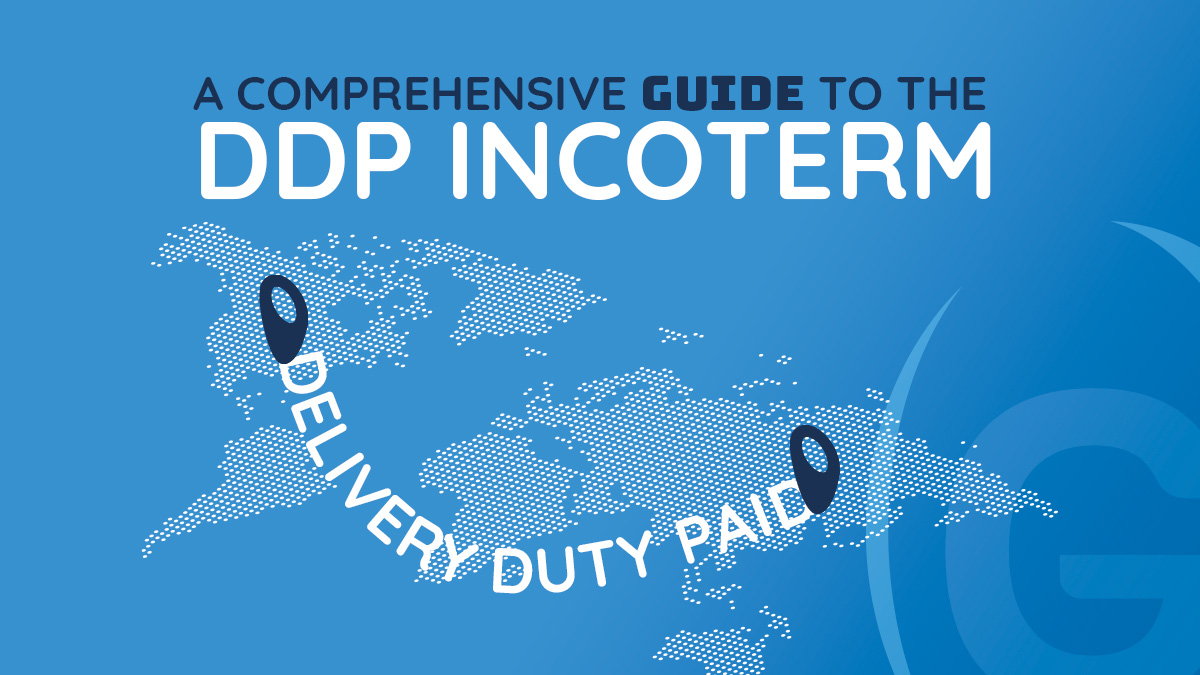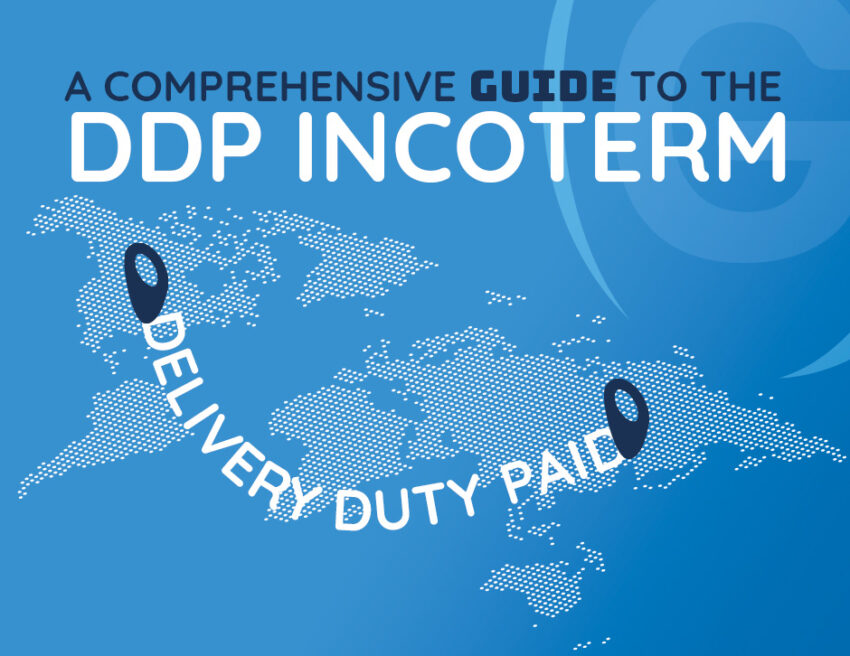In the ever-evolving world of international trade, it’s crucial for businesses to understand the terms and conditions that govern the movement of goods across borders. One of the most commonly used Incoterms is DDP, or Delivery Duty Paid. The DDP Incoterm is a game-changer in simplifying the complexities of cross-border trade. It provides clarity for both buyers and sellers, offering a clear structure for shipping responsibilities, costs, and risks.

What is DDP Incoterm?
DDP stands for Delivery Duty Paid, and as the name suggests, this Incoterm implies that the seller takes on the maximum responsibility throughout the shipping process. Under a DDP agreement, the seller is responsible for delivering the goods to the buyer’s doorstep, including all costs and risks associated with transportation, customs clearance, and import duties. This makes DDP one of the most comprehensive Incoterms for international shipping.
While DDP can be beneficial for both parties, it is especially advantageous to the buyer, as they do not need to worry about handling customs procedures, taxes, or delivery issues. The seller assumes full responsibility until the goods are delivered to the specified location, usually the buyer’s premises.
The Responsibilities of the Seller Under DDP
Under DDP, the seller assumes most of the responsibility for the delivery of goods. The seller’s duties include arranging and paying for the entire transport, including export and import customs clearance. These responsibilities extend to covering any import taxes, tariffs, or duties in the buyer’s country. The seller must ensure that the goods are delivered to the designated place, and they are responsible for any potential delays or issues along the way.
Additionally, the seller must ensure that the goods comply with all regulations in both the export and import countries. This includes providing the necessary documentation, such as invoices, certificates of origin, or any other paperwork required for customs clearance. Since the seller is in charge of customs duties, they must also ensure the goods pass through customs smoothly and promptly.
Another key responsibility for the seller is managing the risk throughout the transportation process. This means that if the goods are damaged or lost in transit, the seller bears the financial burden of replacing or compensating for the lost items.
The Responsibilities of the Buyer Under DDP
The buyer’s role under a DDP agreement is relatively simple. Since the seller takes on most of the responsibilities, the buyer only needs to wait for the goods to arrive at their doorstep. In a DDP transaction, the buyer is responsible for receiving the goods and checking them upon arrival to ensure they meet the agreed-upon terms.
Although the buyer’s responsibilities are fewer, there are still some key areas where they play a role. For example, the buyer should ensure that the destination point is correctly specified in the contract, as this will determine where the seller needs to deliver the goods. The buyer is also responsible for any costs that arise from issues not covered by the DDP agreement, such as post-delivery storage fees or re-delivery charges if they cannot be reached.
Key Benefits of DDP Incoterm
DDP simplifies the shipping process for both the seller and the buyer, making it one of the most attractive Incoterms for international transactions.
For the buyer, the main advantage of DDP is convenience. The buyer does not need to worry about dealing with the complexities of customs clearance, taxes, or transport logistics. Since the seller assumes responsibility for all costs, the buyer knows the exact price of the goods upfront, without unexpected hidden fees. This reduces uncertainty and allows businesses to manage their budgets more effectively.
Moreover, the buyer does not have to manage the paperwork, such as import documentation, that is typically required in international trade. With DDP, all these tasks are handled by the seller, allowing the buyer to focus on other aspects of their business.
On the seller’s side, DDP is an excellent way to demonstrate superior customer service. By offering DDP as part of their shipping options, sellers make the buying process easier for their customers, thus fostering long-term relationships. Offering this service can make a company stand out in a competitive market and attract customers who value hassle-free delivery. Furthermore, sellers can build a reputation for reliability by ensuring that all aspects of the delivery, including duties, are managed smoothly.
Potential Drawbacks of DDP Incoterm
While DDP provides numerous benefits, it’s important to acknowledge the potential challenges as well. The most significant drawback for the seller is the level of responsibility they must take on. The seller is liable for all risks and costs associated with the shipment, including any unexpected issues like delays, damages, or complications with customs clearance. This places the burden of risk squarely on the seller, which may not always be ideal, especially for smaller businesses or sellers with limited resources.
Another challenge for sellers is that they must familiarize themselves with the laws and regulations in the buyer’s country. Each country has its own set of rules regarding importation, customs clearance, and duties, and the seller is responsible for navigating these legalities. This requires a strong understanding of international trade laws and the ability to work with reliable partners to manage the various stages of the shipping process.
For the buyer, although DDP can be convenient, it can sometimes result in higher costs. Since the seller is responsible for all the logistics and duties, these additional expenses are often reflected in the final price of the goods. Buyers may sometimes feel that the convenience of DDP is offset by the higher cost, especially if they already have established relationships with local customs brokers or logistics providers.
Is Delivery Duty Paid Incoterm Right for Your Business?
Choosing the right Incoterm depends on a variety of factors, such as the nature of the goods being transported, the size of your business, and your target market. DDP is a solid option if your business is looking to offer a seamless and customer-friendly experience to buyers. If you are a seller with the capability to manage international shipping, customs clearance, and duties, DDP can help build customer trust and satisfaction.
For buyers, DDP offers peace of mind and simplicity, but they should be aware that the convenience comes with a price. It’s important to assess whether the added cost aligns with the buyer’s expectations and whether they are willing to pay a premium for the all-inclusive service that DDP provides.
Conclusion
In conclusion, the Delivery Duty Paid Incoterm is an incredibly powerful tool for simplifying international trade. It offers clarity, convenience, and peace of mind for both buyers and sellers. By taking on the maximum responsibility, sellers can build stronger relationships with customers, offering them a hassle-free experience. Buyers benefit from an all-inclusive service that eliminates the complexities of customs clearance, taxes, and transport logistics. However, it is important to weigh the potential risks and costs associated with DDP, especially for smaller businesses or sellers with limited international shipping experience. Ultimately, DDP serves as a valuable Incoterm for those looking to simplify international trade and provide a seamless shipping experience.


